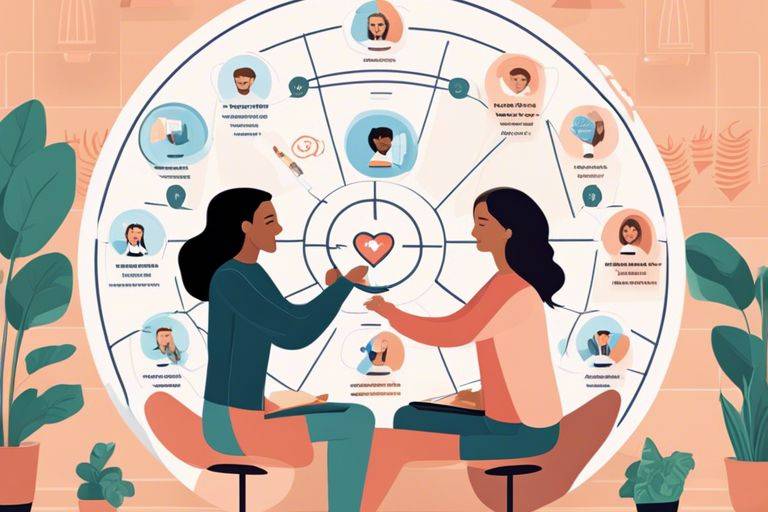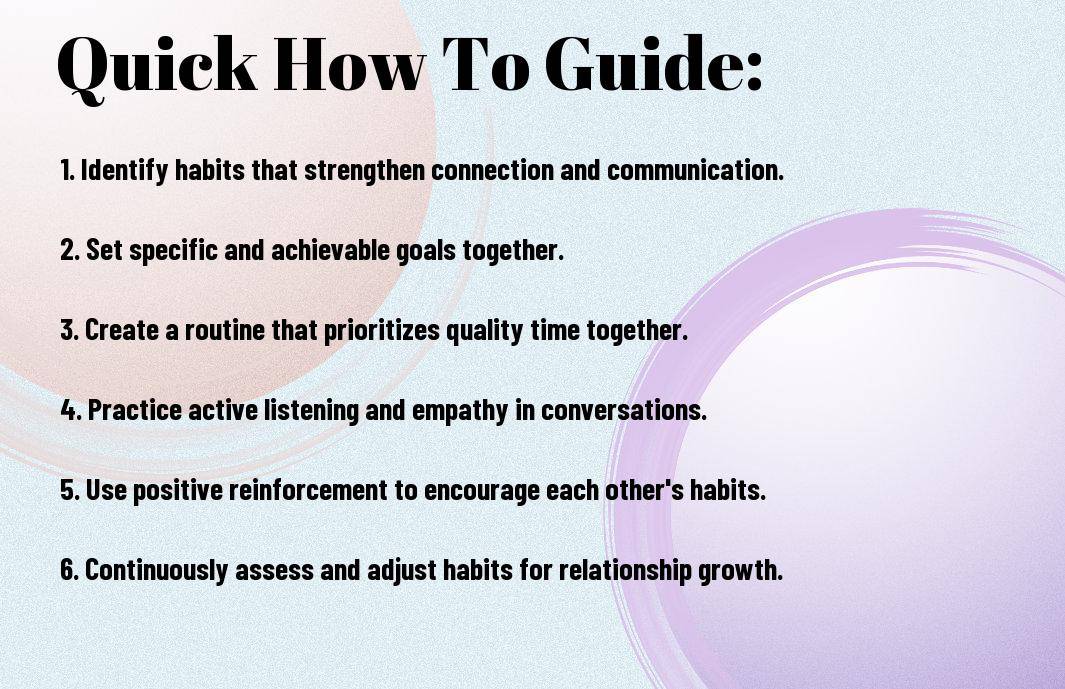
Newsletter Subscribe
Enter your email address below and subscribe to our newsletter

Enter your email address below and subscribe to our newsletter

Transform your relationship with tiny changes—explore Atomic Habits for couples to foster trust, enhance communication, and build a lasting bond through small, consistent actions.
Communication is the cornerstone of any successful relationship, but what if I told you that tiny, consistent changes could drastically improve your connection with your partner? In this guide, we will explore the power of Atomic Habits for couples, uncovering the secrets to building a strong and lasting bond.
By implementing small, positive habits into your daily routine, you can transform the way you and your partner interact, ultimately strengthening the foundation of your relationship. From enhancing understanding and empathy to fostering trust and intimacy, these Atomic Habits have the potential to revolutionize the way you and your partner relate to each other.

There’s something incredibly powerful about creating habits that can enhance and strengthen the bond between two individuals in a relationship. By applying the principles of Atomic Habits, couples can build a solid foundation for a healthy and lasting connection.
Atomic habits play a crucial role in understanding the dynamics of your relationship. By observing and analyzing your habits as a couple, you can identify patterns that either contribute to the harmony or discord in your partnership. It’s important to recognize the positive habits that nurture your bond and address any dangerous habits that may be causing rifts in your relationship.
An important part of laying a strong foundation for your relationship is establishing common goals and values. Shared aspirations and values provide a roadmap for a couple to navigate challenges together and celebrate successes as a team. Take the time to sit down with your partner and discuss your individual goals and values, finding where they align and where they may diverge.
Values serve as guiding principles that shape your choices and actions in a relationship. When both partners are clear on their shared values, they can make decisions and create habits that support their mutual vision for the future.
Unlike individual habit-building, creating atomic habits as a couple involves recognizing the ineffective patterns that may be hindering your relationship growth. One of the first steps is identifying these patterns together to address them as a team.
Knowing your weaknesses as a couple is the first step towards turning them into strengths.
While building atomic habits as a couple, it’s necessary to consider various factors that can influence the success of your habit formation journey. Factors such as your environment, triggers, and rewards play a significant role in shaping your habits together.
Perceiving these factors and actively working on them can greatly impact the habits you build together.
If one partner is more motivated than the other to work on developing atomic habits as a couple, it’s important to find a balance and approach that works for both individuals. Ensuring that both partners are equally invested in the process can lead to more sustainable changes in your relationship dynamics.
Perceiving and addressing these differences can pave the way for a stronger and more united relationship.
It’s crucial for couples to work together in identifying ineffective patterns, considering necessary factors in habit formation, and finding a balance in motivation and commitment to build atomic habits that strengthen their relationship bonds.
After implementing foundational habits in your relationship, it’s time to focus on communication as the core of habitual growth. Effective communication is important for understanding each other’s needs, resolving conflicts, and fostering a strong bond. By honing your communication skills, you can strengthen your connection and build a solid foundation for lasting habits that will enhance your relationship.
Core to refining your communication habits is the art of listening and speaking. Practice active listening by giving your partner your full attention, maintaining eye contact, and summarizing what they’ve said to ensure understanding. Speaking with empathy and honesty is equally important. Use “I” statements to express your feelings and avoid blaming language to foster a safe space for open dialogue.
Assuming non-verbal cues play a crucial role in communication, pay attention to body language and gestures. Simple actions like holding hands, hugging, or making eye contact can convey love and support without saying a word. Non-verbal communication can deepen your connection and enhance the trust and intimacy in your relationship.
The subtleties of non-verbal communication can either strengthen or weaken your habits as a couple. Positive body language can reinforce feelings of security and understanding, while negative gestures may lead to misunderstandings. Being mindful of your non-verbal cues can enrich your communication habits and nurture a stronger bond with your partner.

To build a strong and lasting relationship, it is important for couples to prioritize emotional intimacy by creating habitual connections. Emotional intimacy is the foundation of a healthy relationship, allowing partners to truly understand and support each other. By establishing daily habits that nurture this emotional connection, couples can deepen their bond and strengthen their relationship over time.
Through daily check-ins, couples can set aside dedicated time to connect with each other on a deeper level. This simple yet powerful habit involves sharing highs and lows of the day, discussing any challenges or victories, and expressing gratitude for each other. Regular communication through daily check-ins fosters a sense of closeness and strengthens the emotional bond between partners.
On the journey to building a deeper connection, cultivating empathy and understanding through regular practices is key. Empathy allows partners to truly listen and empathize with each other’s feelings, fostering a sense of support and validation in the relationship. Regular practices such as active listening, reflective communication, and engaging in shared activities can deepen the emotional connection and promote a deeper understanding between partners.
Connection is not just about spending time together; it’s about actively engaging with each other in a meaningful way. By creating intentional habits that prioritize emotional intimacy and understanding, couples can foster a deeper connection and build a stronger relationship that withstands the test of time.
All Marriage Revolution – I recently read Atomic Habits and it inspired me to investigate into how couples can use habits to strengthen their financial relationship. Money matters can often be a source of tension in a relationship, but by establishing shared financial goals and habits, couples can work together towards financial stability and harmony.
Financial communication is key when developing shared financial goals and habits as a couple. Start by having open and honest conversations about your individual money mindsets, goals, and concerns. Together, set short-term and long-term financial goals that align with your values as a couple. Create a budget that reflects these goals and track your progress regularly to stay on the same page.
Assuming responsibility for your own financial well-being and actively participating in managing your joint finances can strengthen your relationship and build a solid foundation for the future. Perceiving money as a tool to achieve your shared dreams and aspirations can shift the focus from individual interests to a collective vision for your life together.
Financial disagreements can be one of the most significant sources of conflict in a relationship. Understanding each other’s perspectives on money, addressing any underlying issues, and working towards mutual financial goals can help create a positive and supportive financial dynamic. By perceiving money as a means to enhance your relationship and life experiences rather than a source of tension, you can foster a healthy financial environment that strengthens your bond as a couple.
Despite the various challenges that may arise in a relationship, developing atomic habits can strengthen the bond between partners. In his article on 3-2-1: Failure, mindset, and relationships, James Clear emphasizes the importance of understanding the dynamics of personal growth within a relationship. Finding the balance between individuality and togetherness is imperative in habit development for couples.
Some habits are deeply ingrained in individuals, shaped by past experiences and beliefs. Respecting personal habits while striving for growth as a couple requires empathy and open communication. Acknowledging each other’s unique traits and preferences can pave the way for a harmonious habit-building process. It is crucial to create a safe space where both partners feel supported and valued in their journey towards self-improvement.
Now, when it comes to supporting each other’s personal growth, there are a few key strategies that can nurture a thriving relationship. Active listening plays a vital role in understanding your partner’s needs and aspirations. Expressing encouragement and praise for small wins can boost motivation and create a positive atmosphere for habit development. The key lies in actively participating in each other’s growth journeys while maintaining respect for individual differences.
Growing together in a relationship involves embracing the uniqueness of each partner while working towards common goals. The journey of habit development can be enriching when both individuals support and uplift each other through positive reinforcement and commitment. The bond formed through mutual encouragement and understanding can lead to a stronger foundation for a long-lasting and fulfilling relationship.
Not every day will be smooth sailing in a relationship, especially when trying to establish new habits. It’s important for couples to remember that setbacks are normal and to approach challenges with a growth mindset. Concerning maintaining progress and overcoming obstacles, communication is key.
Progress in building or breaking habits can be derailed by relapses and conflicts that arise in relationships. It’s crucial to address these issues head-on with compassion and understanding. Couples can navigate these challenges by setting aside time to discuss feelings openly and honestly. By actively listening to each other’s perspectives and offering support, partners can work together to find solutions and move forward.
Maintaining a strong and healthy relationship requires resilience to overcome obstacles together. Factors that can enhance resilience in couples include trust, empathy, and commitment to personal growth and the relationship. Perceiving setbacks as opportunities for learning and growth can help partners navigate difficulties and strengthen their bond.
That being said, developing resilience is an ongoing process that requires patience and dedication from both individuals. Building a foundation of trust and open communication can help couples weather challenges and emerge stronger than before. By fostering a sense of teamwork and mutual respect, partners can tackle obstacles together and thrive in their shared journey.
For couples on a journey to strengthen their relationship through atomic habits, celebrating successes along the way is crucial. Acknowledging milestones can provide a sense of accomplishment, boosting morale and motivating both partners to continue their positive habits.
One way to keep the momentum going in your relationship is by setting small, achievable goals together. Creating a shared vision and working towards it can strengthen your bond and build a sense of unity. Communication is key in this process, as openly discussing progress and setbacks can help redirect efforts effectively.
Little celebrations along the way, whether it’s a mini date night to mark a milestone or simply expressing appreciation for each other’s efforts, can go a long way in reinforcing positive habits.
Celebrating and acknowledging your successes as a couple is crucial to maintaining motivation and strengthening your bond. Keep in mind, every step towards building healthier habits is a step in the right direction for your relationship. Any progress is worth recognizing and celebrating together.
Upon reflecting on the principles discussed in Atomic Habits for couples, it becomes evident that small, consistent actions can significantly impact the strength and success of relationships. By focusing on creating positive habits together, couples can foster better communication, connection, and mutual support in their relationship.
Be mindful of, the key to strengthening relationships lies in the daily choices and habits that each partner makes. By implementing the strategies outlined in Atomic Habits, couples can build a strong foundation for a happy and fulfilling partnership that will last a lifetime.
A: Building atomic habits is important for couples because it helps create a strong foundation of trust, understanding, and communication in the relationship.
A: Atomic habits can improve communication between partners by establishing consistent routines for open and honest dialogue, active listening, and empathy.
A: Examples of atomic habits that couples can implement together include setting aside dedicated time for meaningful conversations, expressing gratitude daily, and practicing acts of kindness towards each other.
A: Atomic habits can help in resolving conflicts by encouraging couples to approach disagreements with a growth mindset, focus on finding solutions rather than blame, and actively working towards compromise and understanding.
A: Consistency is crucial in building atomic habits for couples as it creates a sense of reliability, trust, and security within the relationship, making it easier to reinforce positive behaviors over time.
A: Couples can support each other in sticking to their atomic habits by holding each other accountable, providing encouragement and positive reinforcement, and celebrating small victories along the way.
A: The long-term benefits of practicing atomic habits for couples include a deeper emotional connection, improved intimacy, a stronger bond, and a more fulfilling relationship built on mutual growth and development.